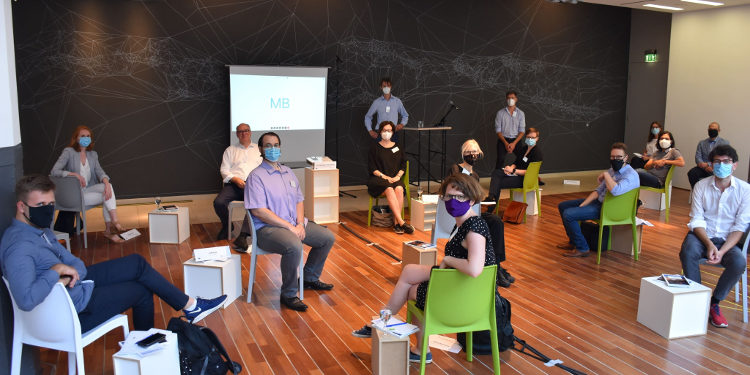Making sense of our connected world

European AI and IoT – First roundtable in cooperation with the Represenation of the European Commission in Germany
The first Roundtable of HIIG’s AI & Society Lab hosted in cooperation with the Representation of the European Commission in Germany was our kick-off for an exchange on European AI and the Internet of Things (IoT) between science, politics, industry and civil society. In this interview, lab coordinator Daniela Dicks gives an insight into the discussions on the opportunities and challenges of AI and IoT.
Why the roundtable event series?
Daniela Dicks: The international debate on Artificial Intelligence (AI) is currently dominated by ethical considerations for AI development on the one hand and regulatory approaches for AI systems on the other.
With our work at the AI & Society Lab we want to focus on concrete changes and challenges that AI introduces and on their societal implications, alongside the general question how society changes with the increasing integration of AI in political, social and cultural processes.
One way of doing this is by teaming up with partners who have an interest in exploring these questions with us. In the context of the implementation of its AI White Paper, we are organising this roundtable event series together with the Representation of the European Commission in Germany. Over the course of two months, we aim at tackling four key topics at the intersection of AI and society.
The main goal of this series is to foster the exchange between different interest groups on the topic of AI on the basis of practical examples and to discuss what a European AI could look like in concrete terms.
Which organisations were represented at the Roundtable?
Daniela Dicks: Due to the current circumstances, we were unfortunately somewhat restricted with regard to the number of participants. However, we carefully put together a mix of stakeholders from academia, business, politics and civil society – representatives from organisations such as Bitkom, T-Systems and the KI-Verband as well as from the Gesellschaft für Informatik, Stiftung Neue Verantwortung and the Weizenbaum Institute, to name only a few.
In our view, this mix enables a healthy and straight-forward balance allowing for very different perspectives to be acknowledged.
What role does the EU Commission play in the roundtables?
Daniela Dicks: The EU Commission plays a key role in this event series. We are very grateful for this cooperation as this is a great opportunity to bring together the expertise, experience and relevant networks of both our institutions in order to make a meaningful contribution to AI research and development. With its Whitepaper the EU Commission has laid an important groundwork for the societal debate on AI that European citizens were able to comment on during the consultation phase.
This roundtable series is yet another chance especially for business and civil society actors to formulate appeals with regard to European legislation on AI as the results of the discussions will directly feed into the Commission’s work.
From your point of view, what was the most important result of the 1st Roundtable?What did you find most surprising in terms of content?
Daniela Dicks: Let me start with some numbers on IoT and decentralized data, the topic of this first roundtable: I was surprised to learn from our colleagues at the Commission that today, 80% of the data we generate is stored and managed in the cloud, in centralised servers. The rest is generated and processed at the periphery – “at the edge”, for instance, in connected vehicles or smartphones. By 2025, this proportion will be reversed. Europe must therefore be prepared to take advantage of this development. The question is: are we ready?
One of the most important results of the roundtable was that all participants, regardless of their sector affiliation, emphasized the relevance of making regulations accessible to both decision-makers in technology companies and civil society organisations. This ‘explainability aspect’ is something that we keep coming across in the context of our research on AI, so that gave us a good indication of what’s deemed most relevant.
As far as the general output of the roundtable is concerned we are very satisfied with the quality of the discussion. In our view, we need such platforms that allow for open debate, constructive and – above-all – practice-oriented exchange among different interest groups.
The roundtables are intended to initiate a dialogue on AI between science, politics, business and civil society – but the interests of these groups can be far apart.
How can a constructive, result-oriented exchange be achieved?
Daniela Dicks: Based on our experience from this first edition of the roundtables we would actually encourage participants of the following events to spark even more controversies than what we have seen last Wednesday (laughing).
There are still many issues in the area of AI and society to be resolved and we are preparing ourselves for at times difficult but fruitful exchanges, happy to do our part to further strengthen this important discourse.
As part of our new AI & Society Lab, we are hosting a series of roundtable events in cooperation with the Representation of the European Commission in Germany which address the Commission’s White Paper on AI. The following key topics will be discussed:
- Roundtable: European AI and the Internet of Things IoT
- Roundtable: Inclusive AI
- Roundtable: AI and sustainability
- Roundtable: AI by and for women
This post represents the view of the author and does not necessarily represent the view of the institute itself. For more information about the topics of these articles and associated research projects, please contact info@hiig.de.

You will receive our latest blog articles once a month in a newsletter.
Artificial intelligence and society
Polished yet impersonal: The unintended consequences of writing your emails with AI
AI-written emails can save workers time and improve clarity – but are we losing connection, nuance, and communication skills in the process?
AI at the microphone: The voice of the future?
From synthesising voices and generating entire episodes, AI is transforming digital audio. Explore the opportunities and challenges of AI at the microphone.
Do Community Notes have a party preference?
This article explores whether Community Notes effectively combat disinformation or mirror political biases, analysing distribution and rating patterns.




